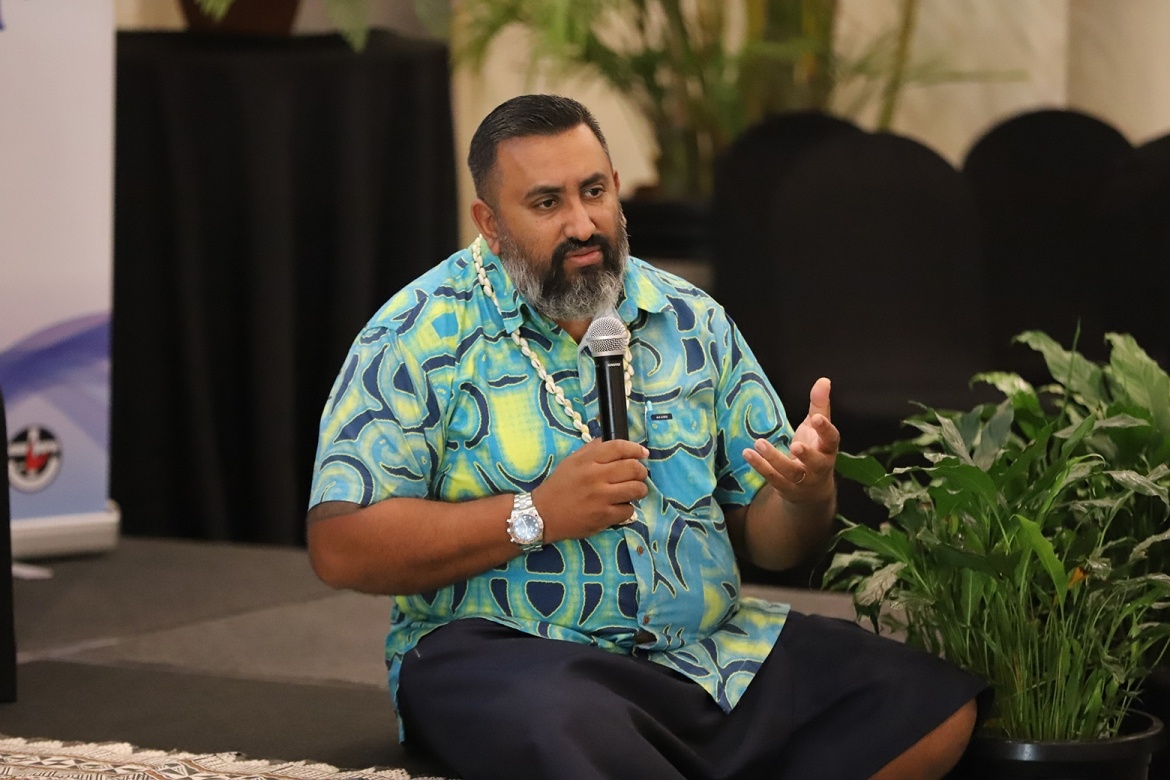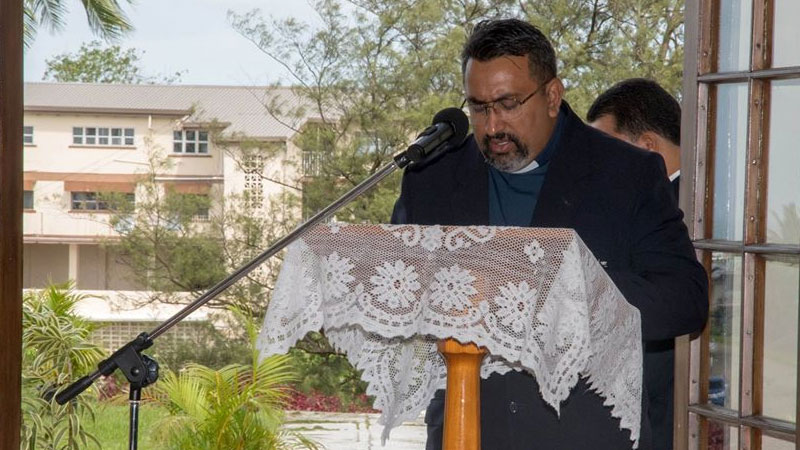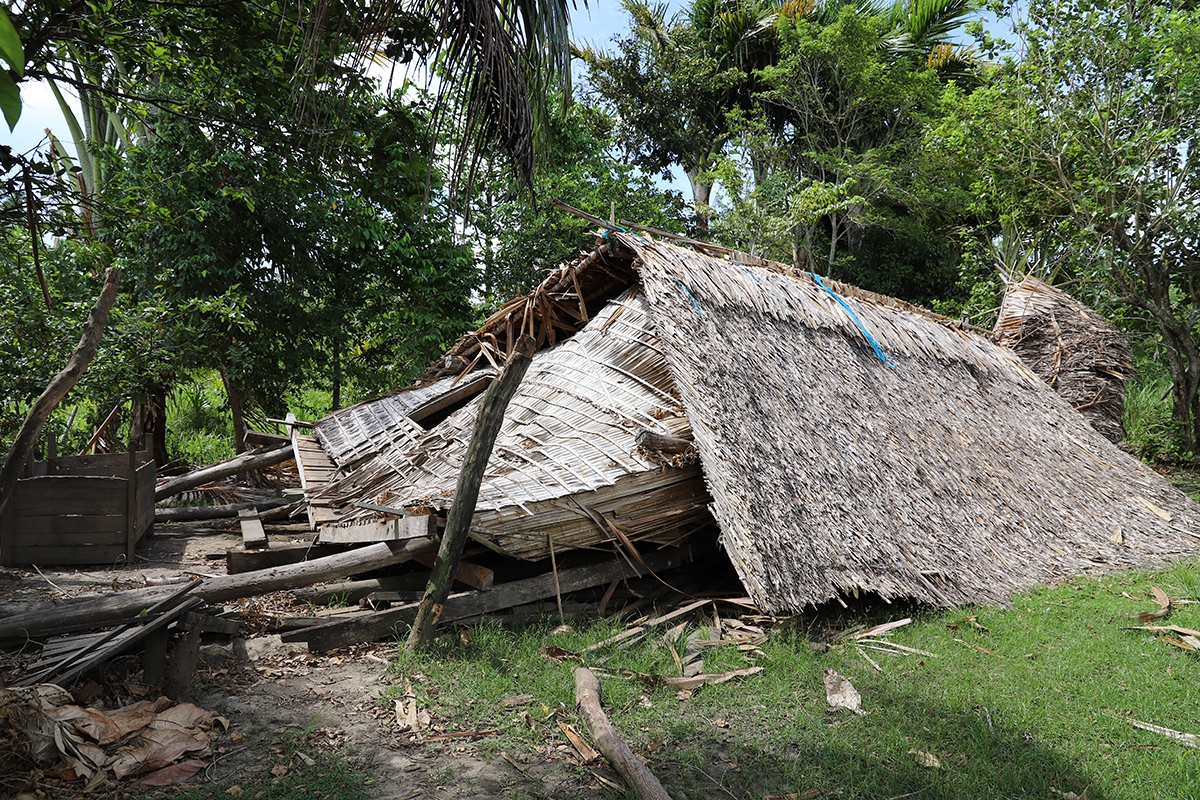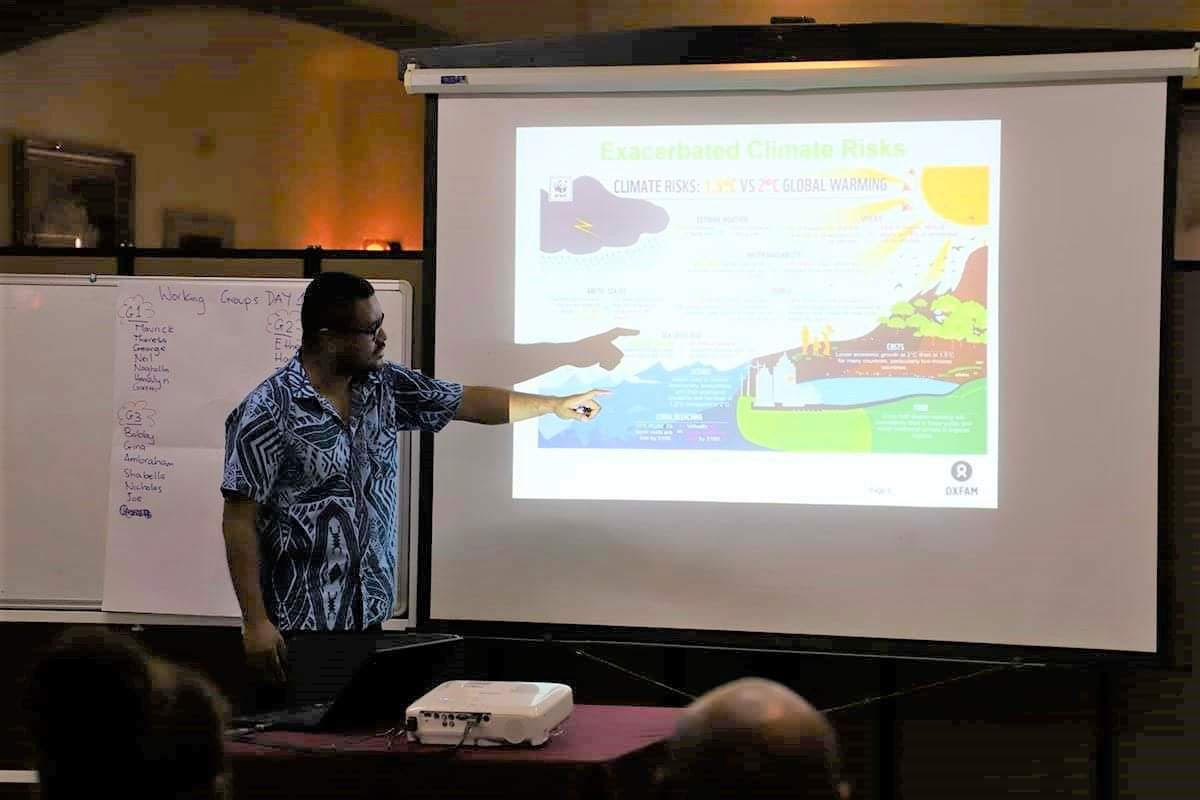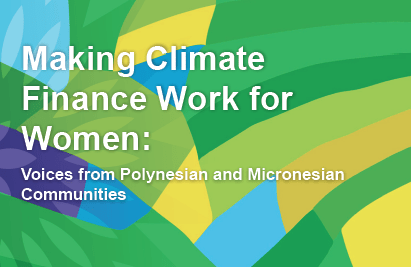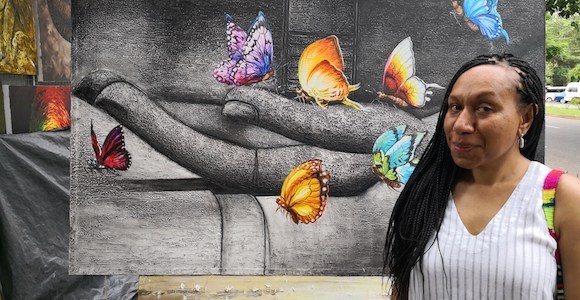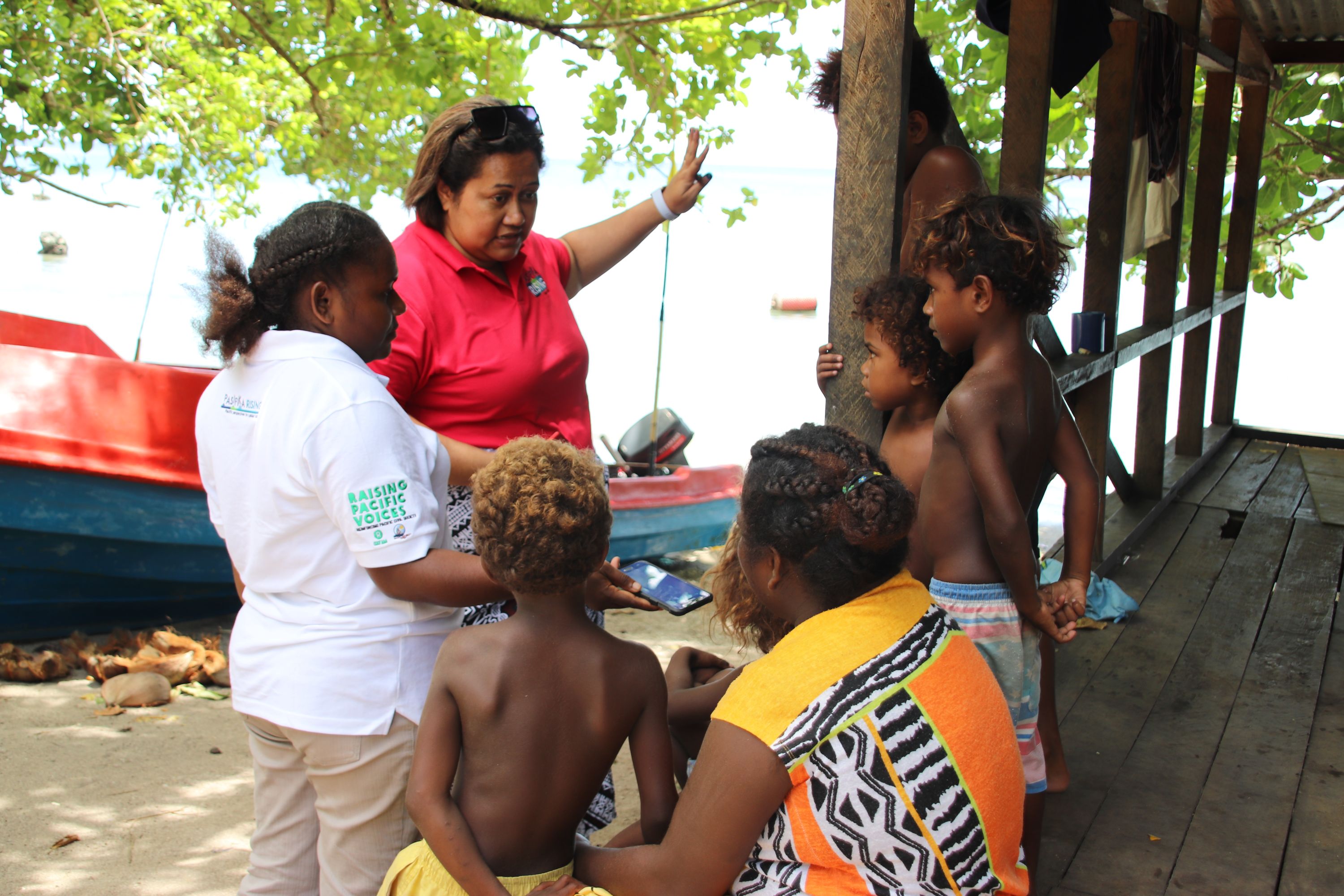The General Secretary for the Pacific Conference of Churches (PCC) Rev. James Bhagwan was one of the keynote speakers at the Uniting Church in Australia President’s Conference in Fiji from 13-17 July 2019.
In an interview reflecting his key themes, James shares how the Pacific is on a journey of self-determination, reclaiming itself as a large “liquid continent” and people connected by the ocean. He reflects on the impacts of climate change in the Pacific where land and sea are bound to culture and a sense of belonging. He describes the work of the PCC and the role of the Church find ways to both speak truth to power and find practical responses from the grassroots up.
Here is a transcript of his interview.
For many generations, Westerners have continued to look at the Pacific as small dots in a big ocean. On the atlases we’re on the edge of the page hardly ever together.
And in response as a counter to feeling small and insignificant Pacific Islanders have taken on that we are not small island developing states but we are large ocean states. And the recognition that has come through our philosophers, and our traditional wisdom, our history of voyaging in our big canoes that trav Save ersed the ocean.
We understand the ocean does not separate us. It’s what connects us. So we recognise that the ocean is our home and part of who we are.
And we have seen terms now develop that are about the Liquid Continent, about the Blue Pacific, or the Blue Continent, recognising that the Ocean is part of who we are. It’s part of our identity and, that is part of our greatness as well.
Because well before Captain Cook, and all the others came into the Pacific, our people, our ancestors were traversing this ocean bringing culture, exchanging. Not just one way. There was exchange of food, of culture, of stories, of history, of knowledge. And so, today we recognise that is the identity that we would like to claim.
It is counter-cultural. It is post-colonial. It is part of our self-determination as a people of the Pacific, that this is our greatness. I think for us, really that is about also the way in which we reframe all our conversations and how we do theology, even.
Not only are we part of the ocean, we are part of the land. In fact, in most traditional Pacific Island cultures, the self does not exist. We exist in community. We exist as part of the natural environment, which is the land, the sea, the sky, and all creation. Our traditional spirituality is a creation-centred spirituality.
The challenge for us is that we’ve been disconnected from that as part of the colonial influence that we’ve had. Often by accident missionaries who came from another context and saw life in that sense and understood identity in one particular way and assumed that was the only way.
But if we look at the context of climate change and what we are witnessing happening to our land, to our seas, to our people, it becomes more than an existential threat to what we hear from academia, the end of the Anthropocene. We are talking more than that because we are feeling about what will happen to our identity, or what we belong to.
Of course, we understand that the Earth will respond in its own way, and over time will respond to the challenge of climate change. God’s creation will respond in that way.
And so, in that sense that is something that is strangely comforting but at the same time, as people of God, you are called to care for those who are affected by this, by their vulnerability, because of climate change.
The sense of justice, the sense of providing sacred space, safe space, hospitality and helping people be accompanied in that journey, where they are actually for the first time having to uproot themselves from generations of embedment, in the land, in the sea, and come to somewhere else.
Knowing that in the time before we were voyaging people, perhaps some of that is about how we reclaim that but also knowing that people are always in search of a place to be rooted.
We do that with our spirituality. We look for spirituality that we can root ourselves in. And this is the same with climate change.
So, our role in that is how we respond to the threat to creation of which we are a part and our accompaniment of people who are part of our family, or our extended family, as Pacific Islanders, as human beings.
The Pacific Conference of Churches is mandated by our 30 member churches which include the Uniting Church in Australia, our National Councils of Churches of which the National Council of Churches in Australia is a valued partner, to speak on issues of justice on behalf of the churches on the regional and international arena.
But also to speak to our churches as well on key issues, and that is what we call our prophetic role.
The prophetic role to speak God’s truth in love to God’s people. We can only do that if we are doing the very things that we call for.
We live in a world where there is so much rhetoric, by politicians, by the UN, by so many organisations where development models are imposed on us. Where we are consulted for what we think, but we are not included in the programs once they’re developed. Or we are only seen as part of the process of implementation.
In that sense we are called to speak truth to power to those powers that will continue to try to control the Pacific and the destiny of God’s Pacific people and Pacific creation.
The other side is, of course, we can only do that if we are doing the work within the community. So as Church we are called to be pastoral in our approach.
The risky solidarity, and accompaniment that Jesus showed. We are called to live that ministry in our work.
We’re also called to be practical. Again, understanding the rhetoric, understanding that sometimes we live in a world where it’s the tick-box mentality.
You come and you do a program and you go: ‘What is the practical solution? What are the practical solutions? How do we guide churches towards the practical solutions?’
That can be part of the change that they need to journey better towards God’s Kingdom. Or to equip and build their capacity for the work that they are called to do. That is the sense that we talk about that things must be intentional and practical in what we do, that we must be pastoral in what we do.
We must put our congregations at the centre of what we do, even though we are a regional organisation. We must be thinking about the grassroots and about the environment.
And we are called, however difficult, to go to those places where the church’s voice needs to be heard. Speak boldly and humbly at the same time, which is a challenge.
Well, one of the things we’ve decided to do at the PCC office is to make use of the coconut leaves that are either trimmed from trees or fall and to weave baskets that will act as our waste-bins.
Not the small ones that we have inside the office. But we’re going to be putting those in all the areas that we, that we have a presence of in the capital city and encourage the people to put their rubbish in there. To start to think.
And so, it’s really around our practical application of our theology, of our pastoral work but that goes beyond just a mere action that calls for reflection, which then continues the cycle.
That is one. And finding ways in which to engage in symbolic actions which have quite deep significance in the Pacific. So bringing those two, the practical and symbolic, together.And it’s an exciting time, where we are rethinking of how we look at development.
So, a lot of this stuff is counter-cultural, even for Pacific Islanders who have embraced a very Western type of lifestyle.

